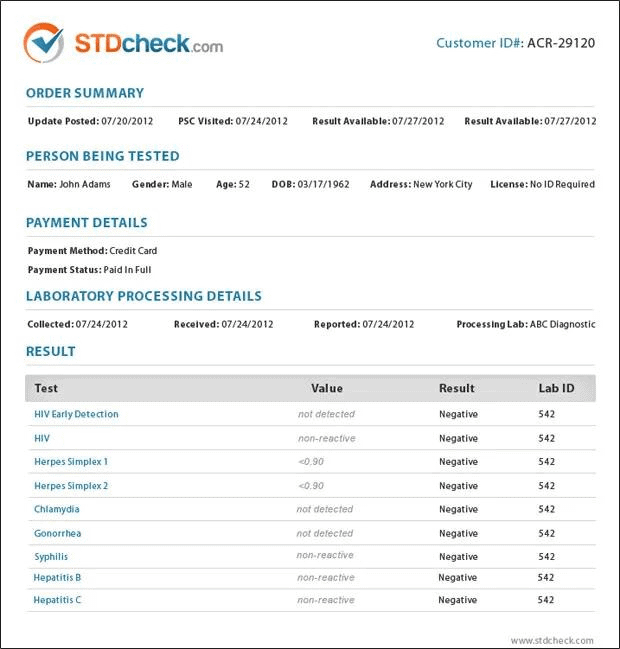Getting yourself tested for sexually transmitted diseases (STDs) is important for one’s wellbeing, especially if you’re sexually active. Fortunately, these days, you can do a test at home with an STD panel kit. Wondering what is included in a full STD Panel or how the testing process goes? Scroll down this article to learn more.
Full STD Panel – What Is Included & Tested For?
A full STD (sexually transmitted disease) panel is a comprehensive test that screens for a range of different STDs. The exact list of STDs included in a full panel may vary depending on the specific test and the laboratory that performs it.
A full STD panel from a company like STDCheck.com includes testing for these 10 STD’s:
– HIV type 1
– HIV type 2 antibody/antigen (4th gen)
– Herpes type 1
– Herpes type 2
– Hepatitis A
– Hepatitis B
– Hepatitis C
– Chlamydia
– Gonorrhea
– Syphilis
What’s Inside The STD Panel?
You can visit your trusted physician’s office or the nearest STD clinic for an STD Panel. You can also get an STD panel kit from hospitals and clinics for you to do at home. The benefit of home testing is that it allows you to collect samples privately without needing a pelvic exam or office visit.
Depending on where you get tested, each STD panel kit may include different tests for up to 14 STDs, so always ask what’s included.
While there is no way to test every STD, medical professionals usually test for its most common types, such as the following:

Chlamydia & Gonorrhea
The common way of testing gonorrhea and chlamydia is done either with a urine test or with a swab to take a sample inside a man’s penis or a woman’s cervix. A laboratory will then analyze the samples taken to determine if you test positive for either disease.
Have more than one sexual partner, or your partner has been with multiple people since your last HIV test.
You should get tested for either STD if:
- You are a sexually active female under the age of 25
- Are a man in a same-sex relationship
- Are a sexually active female over the age of 25 and actively engaging in frequent sexual activities with multiple partners
- Have been forced to engage in sexual activity against your will
- Currently have an active case of HIV
If you do test positive, it is recommended to undergo retesting for chlamydia/gonorrhea about three months after treatment for their initial infection.
Hepatitis B & C
The standard test for hepatitis B is a blood test, while hepatitis C uses antibody blood testing for routine HCV screenings for acute (new) and chronic (long-term) infections.
You should get tested for hepatitis B/C if:
- You use intravenous drugs and share needles
- Are a man in a same-sex relationship
- Are pregnant
- Have been forced to engage in sexual activity against your will
- Blood and tissue donors
- Have been in contact with people or have sexual relations with people who have chronic HBV infection
Herpes 1 & 2
For both herpes 1 & 2, blood testing is used to detect the antibodies the body produces in response to herpes. Those affected by herpes 1 (oral herpes) usually have minimal or no symptoms, while herpes 2 (genital herpes) causes more noticeable symptoms like itching, blisters, and ulcers.
You should get tested for herpes 1 & 2 if:
- Are a woman (The virus is sexually transmitted more easily from men to women than it is vice versa)
- Have multiple sexual partners.
- Have been in physical contact with an infected person.
HIV 1 & 2
For HIV-1/2, 4th Generation Antigen and Antibody testing is recommended to diagnose said infections, including acute infection, and differentiate HIV-1 from HIV-2. It is consistent with the HIV diagnostic algorithm preferred by the Centers for Disease Control and Prevention.
You should get tested for HIV 1/2 if you:
- Are a man who has had unprotected sex with another man
- Have had unprotected sexâanal or vaginalâwith an HIV-positive partner
- Have frequent multiple sexual partners
- Have received unsafe injections, blood transfusions and tissue transplantation, and medical procedures that involve unsterile cutting or piercing; and
- Have experienced accidental needle stick injuries, including among health workers
Experts recommend that everyone aged 13 to 64 should be tested for HIV at least once as part of routine health care. For those who are sexually active, it is best to get tested at least once a year.
Syphilis
STD panels use the Rapid Plasma Reagin (RPR) test, a specific blood test that detects the nonspecific antibodies that develop in the body in response to the infection that causes syphilis. Once the initial test comes back positive, a confirmatory test is performed.
You should get tested for syphilis if you:
- Are a sexually active gay/bisexual man who has frequent sex with men.
- Have had unprotected sexual activities
- Have had sexual contact with a known case of syphilis.
- Had sex with someone from a country/region with a high prevalence of syphilis.
- Had a previous history of syphilis, HIV infection, or other STDs.
Annual testing for syphilis is recommended.
Trichomoniasis
Most STD panels don’t usually include testing for trichomoniasis, so in most cases, patients have to request one. In the past, trichomoniasis was diagnosed by using a microscope to look for the parasite in a vaginal swab. Now, trichomoniasis is detected using DNA amplification or by rapid testing techniques.
You should test for trichomoniasis if you:
- Have multiple sexual partners
- Have unprotected sex
- Have a previous history of trichomoniasis
- Have a history of other sexually transmitted infections
Why Is It Important To Get Tested For STDs?
Getting tested is important because a person can already be infected without even knowing it. In many cases, common STDs cause few or no symptoms. When left untreated, some conditions can cause serious health problems and make you more prone to getting other STDs like HIV.
Early diagnosis of these conditions can facilitate earlier treatment, improve long-term outcomes, and prevent spreading from one person to another.
Effects of STDs on the body
STDs may cause long-term health problems, particularly in women, adolescents, and even infants. Some of these include
- Cervical cancer
- Pelvic inflammatory disease
- Infertility
- Tubal or ectopic pregnancy
- Spontaneous abortions
- Stillbirths
- Blindness
- Neurologic damage
- Death.
For infants born to infected mothers:
- Low birth weight
- Physical deformities and disabilities (blindness, deafness, etc.)
- Nerve damage
- Bone damage
- Enlarged organs
- Perinatal or congenital infections
Other Frequently Asked Questions
Can STDs be cured?
Bacterial STDs like chlamydia, gonorrhea, and syphilis can be treated with antibiotics if treatment begins early enough. Viral STDs like herpes and HIV/AIDS are still not curable, but their symptoms can be managed with some medications. There is a vaccine against hepatitis B, but it will not help if you already have it.
If you don’t have symptoms of an STD, can you still spread it?
Yes. Even if you don’t experience any symptoms, you may still be infected. STDs like syphilis, gonorrhea, and chlamydia can all live in your body without manifesting symptoms and spread to other people.
How often should I get tested?
You should be tested for STDs at least once a year. If you have multiple partners, share intravenous (IV) needles, or have frequent unprotected sex, you should be tested every 3 to 6 months.
How should I prepare for testing?
No fasting or any other preparation is necessary prior to testing, except for chlamydia and gonorrhea, where one should abstain from urinating for at least an hour prior to taking the test.
Key Takeaways
Getting tested for STDs is an important part of maintaining one’s sexual health, and STD panels help keep you right on track. When you go in for a full panel STD test, be sure to know what is included, it is important to ask your trusted healthcare provider which tests will be appropriate for your situation. Make sure to get tested as regularly as possible.
Never go without protection to avoid the risk of getting infected with or passing STDs to your partners. Practicing safe sex always makes a huge difference.
Related Articles
Disclaimer: this article does not constitute or replace medical advice. If you have an emergency or a serious medical question, please contact a medical professional or call 911 immediately. To see our full medical disclaimer, visit our Terms of Use page.







